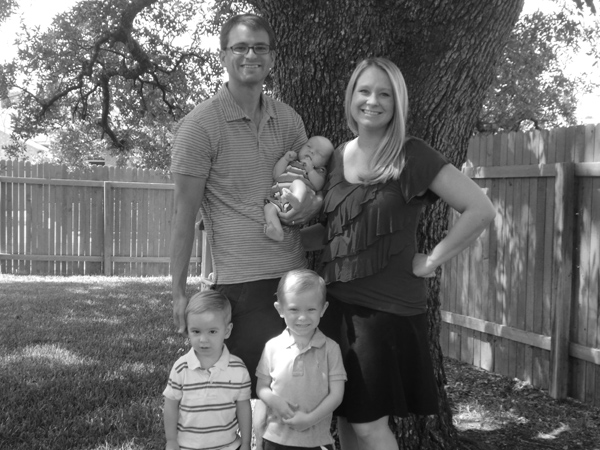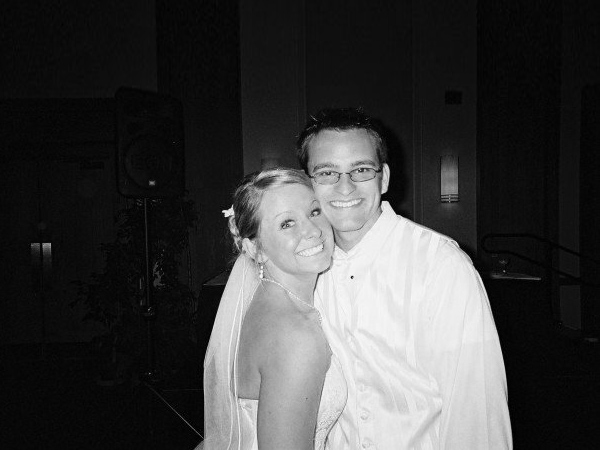Archive for the Interview Category
Jul 2
Interview with Nathan Sherman, Part 3
This is the third post in a three-part blog interview with Nathan Sherman, DSC’s new Minister to Youth and Families. Part 1 explored Nathan’s church background and ministry training. Part 2 explored some of the influences in Nathan’s life. Part three is a little less serious. . .but just a little. Read on!
How do you like to spend your down time? Any hobbies?Â
I love any good story. Whether it’s a true story—a history book or a documentary film—or a fictional story—a novel, movie, or TV series. We are people who love stories, and God has revealed himself to us primarily through story, so I love reading, watching, or listening to stories as they imperfectly but often very acutely point to that Great Redemptive Story.
We also love going to parks and playing with our boys. I also really love baseball. I whole-heartedly endorse pastor David Prince’s sentiment on baseball, the Church, and the gospel. I’m a huge fan of the Texas Rangers and am excited because their AAA team often comes through Albuquerque.
Okay, now a few left fielders:
What is the dumbest thing you did as a kid?
One time I wanted to make a maze out of cardboard boxes for my cat, Coconut. I asked my mom if I could cut up a bunch of boxes to tape together, so that I could see if Coconut could find her way out in a weird lab rat experiment kind of way. My mom wisely said no, so I waited for her to leave the house. I then tore holes in the boxes, since my mom merely told me that I couldn’t cut the boxes. I taped the maze together, put cat food at one end and Coconut in the other end. She completely freaked out, went crazy, and broke apart the first two boxes, making my hours worth of work last for about 2 seconds. Then my mom found out, and I had to spend the rest of the night in my room by myself. A really worthwhile and wise use of a day, that was.
Any odd talents that we should know about up front?
I can beatbox mildly well. I’m well above average on a foosball table. I’m an exceptional Tecmo Super Bowl player on the original Nintendo. And you wouldn’t want to challenge me in riding roller coasters—I’m really good at riding roller coasters.
What’s your favorite animal, and why?Â
A great past-time of mine is proposing hypothetical Octagon of Death scenarios, in which two beings enter without weapons, and only one can exit the Octagon alive. This can include fictional character (Rocky Balboa vs. Rambo) or historical figures (George Washington vs. Abraham Lincoln), but it most often pits two animals against each other. I’m pretty confident in a Bengal tiger’s ability against most of the rest of the Animal Kingdom, so I’ll go with him. Or a Grizzly bear. No, a Bengal tiger. Final answer.
Without going to the internet, do you know what a Lobo is? An Isotope? Carne Adovada?
I know that the Lobo is the UNM mascot, and the Lobo looks like a really vicious, wolfy-looking guy. So I will guess that a lobo is some kind of a wolf?
I’m pretty sure that once upon a time Mr. Williams taught me what an isotope was in high school chemistry. I can’t tell you exactly what an isotope is, but I do know that without isotopes, the Manhattan Project and the creation of the atomic bomb wouldn’t be possible. And I do know that without Isotopes, the Dodgers would have very little Minor League talent.
I took five years of German in high school and college, so my Spanish is not very good. I know that carne means beef, and adovada reminds me of avocado—one of the more superior things that God has created—so I’ll go with some kind of beefy-avocado combination. And I’m sure isotopes were somehow used in creating such a delectable treat.
And, for one last question, red or green?
Green means go. You can sleep when you’re dead.
Many thanks to Nathan for giving such care to these questions. And, just to make sure everyone is clear on this – Nathan had to write me back to share that he looked up “red or green” on the internet and realized that he misunderstood the last question. Of course, part of our purpose in asking was to expose a contextualization weakness and I think we’ve found it!
Pray for the Shermans this week as they transition to Albuquerque, and greet them warmly on July 8, their first Sunday with us at DSC.
Jun 28
Interview with Nathan Sherman, Part 2
Last week we began a three-part blog interview with Nathan Sherman, DSC’s new Minister to Youth and Families. Part 1Â explored Nathan’s ministry background and training. In Part 2, below, we will learn about some of the formative influences in Nathan’s life. We’ll start by learning a bit about the most important person in his life, Marcie.
We had a chance to meet Marcie during your visit with us in May. She’s a marvelous lady. Tell us a funny story from the early stages of your relationship.Â
She is a marvelous lady, isn’t she? Marcie and I are both from Denton, TX, but we didn’t know each other growing up—we went to different churches and high schools. We knew of each other and had a lot of mutual friends but had never met. I went to college in Austin, and she went to the University of South Florida in Tampa to be closer to her family who had just moved back to Florida.
So there was this smarty-pants at Harvard that made this website that allowed you to put pictures of yourself on the internet to make people think that your life is a lot more exciting than it actually is. And in our junior year of college, we became “friends†on this Book of Faces. Always having a secret crush on Marcie, I messaged her, and apparently she had a secret crush on me too because it took about 15 seconds for her to reply. These messages turned into phone calls, plane flights, an engagement ring, and three sons.
How does she complement and strengthen you as a husband and father?Â
First of all, she’s my best friend, which makes the whole one-flesh thing a lot easier because I genuinely love just being around her. She’s a place of rest for me, and I love to just sit and talk about ministry, talk about ourselves, or just watch a TV show with her. She’s bold and not afraid to confront me in the ways in which I’m blind to my sin, stupidity, and laziness. I’ve learned to be a better listener and not talk so much just because she often tells me to shut my mouth. She loves our boys, and even though we’ve only been parents for 3 ½ years, she’s already an exceptional and intentional mother as she’s at home with them.
She also has a Master’s from Southern Seminary in Biblical Counseling and is a really great counselor and discipler of women and girls. I’m excited for the girls in the youth ministry to not only spend intentional time in the Bible together with her but also for them to just watch her be a wife and mom.
What book has had the most impact on your life, besides the Bible?
If I had to only pick one book, I suppose I would pick Desiring God by John Piper. His ideas of Christian Hedonism—God is most glorified in us when we are most satisfied in him—have been extraordinarily influential in my life. If God has created us to find joy, and the place in which we find maximum joy is in him, this changes the way we both pursue God and fight sin. If it’s true that “pleasure is the measure of our treasure,†then the amount of pleasure we have in God is a reliable barometer for our spiritual life.
Tell us about the most influential sermon you’ve heard?Â
In October of 2009, my last year at Southern Seminary, pastor Matt Chandler preached in our chapel service. He preached from Hebrews 11 about those who through faith had conquered and stopped the mouths of lions but also about those who through faith were tortured, imprisoned and put to death. He preached not only about the inevitability of suffering but also its importance in the lives of believers. He prayed that when he inevitably encountered suffering, he would respond well and in faith. This was an extremely challenging sermon to a room full of seminarians who could sometimes tend toward faithless theology, and it would have stood alone as one of the most challenging sermons I ever heard.
However, the next month Matt Chandler had a seizure on Thanksgiving morning, revealing what was thought to be terminal brain cancer. Throughout treatment—and now through his complete recovery—he has been a faithful witness to God’s grace and mercy and absolutely practiced what he preached at Southern the month before. I pray that when suffering comes to me and my family—and it will come—that I will respond by faith in our good and loving Father.
Check back later for Part 3 of this thee-part interview with Nathan.
Jun 20
Interview with Nathan Sherman, Part 1
Earlier this month, we were pleased to announce that Nathan Sherman accepted our offer to serve as DSC’s new Minister to Youth and Families. You can read that original announcement here.
Nathan is quite busy making preparations to move his family of five to Albuquerque in early July, but he was kind to answer a number of questions for what will be a three-part blog interview.
Part 1, below, explores Nathan’s ministry background, training, and hopes for his time at DSC. Part 2 will explore some of the influences that have shaped Nathan’s life. And Part 3 will reveal, among other things, a story of how Nathan terrorized his childhood cat, Coconut.
Before the interview, though, here are two photos of Nathan, Marcie, and their new baby, Micah. One before Micah’s birth and one after. Before the series is out, we’ll have a photo of the whole family together.
First things first. You just had a third little boy, Micah. Congratulations! How’s the family doing?Â
We’re doing great, and Micah is such a great baby! We’ve heard from other families that their third baby was easier than the first two, and that has certainly been true for us, as well. Whether he’s just an easy baby, or we know a little better what we’re doing as parents is unclear, but considering we have three boys under 4 years in the house, we don’t have any complaints. We can’t wait for you to meet Owen, Caleb, and Micah!
You have been on staff at Providence Church in Austin for two years now. Tell us a little about this church, your specific role, and how your time at Providence has formed your approach to ministry.
Providence officially launched in November of 2010, and has been slowly growing over the last year-and-a-half. We’re a part of the Acts 29 Church Planting Network, and we have definitely felt the need to plant more gospel-centered churches in Austin, as it’s the second fastest- growing metro-area in the country. An average of 85 new residents move to Austin every day, which can sometimes feel daunting. By and large though, the people who are being added to our numbers are coming through the missional relationships of our people. We have more people meeting in our Gospel Communities (Community Groups) meeting throughout the city than we have coming to our Sunday service, which means our people are inviting their friends, neighbors, coworkers, etc. into their homes to talk about God and his gospel. In a largely a-religious city like Austin, we are so excited for the way this is unfolding—people coming to faith in Jesus Christ through the lives of the Church rather than merely an attractional Sunday service.
My official title at Providence has been Staff Missionary, and I have been largely acting as intern/pastoral assistant, while also trying to establish and cultivate a missional momentum within our church toward the city. Being a so-called gospel-centered church means that we talk about how the gospel should shape, inform, and transform everything we do—as individuals and as a church. This has completely changed the way I think about and daily believe the gospel. That is, that the gospel is not merely the entry point of the Christian life, but it is the entirety of the Christian life. In turn, that changes how I think about the church, my vocation, my family, my neighbors, and youth ministry. I can’t wait to begin to flesh out many of these things with the DSC youth and their families!
How did you first find out about DSC?Â
In April, Ryan Kelly was at the Together for the Gospel conference in Louisville, Kentucky and providentially sat next to Aaron Colyer, who was my roommate from my freshman year at the University of Texas and is now the Student Pastor at a church in Dallas. They began talking about youth ministry in general, and Ryan mentioned that DSC was beginning their search for a Youth Minister to replace Greg. Aaron said, “I think I have your guy.â€
I talked to Tim Bradley on the phone the next week, and then Marcie and I flew to Albuquerque shortly after that. It has been a pretty quick process, but we’ve had a unique sense of God’s providence and guiding throughout it all.
You are coming to DSC as a Minister to Youth and Families. During your interview weekend, there was a real sense of unity among the elders and you on the importance of the church’s ministry to youth and to families. How did you arrive at this approach to youth ministry?
I was in a youth ministry in the 90s, which meant, like many other youth ministries in America at the time, that the youth ministry was completely quarantined from the rest of the church, and there was very little parent involvement both in the youth ministry and in the discipleship of their children. I think I always thought this wasn’t really ideal, but just kind of the way it was.
In seminary, the discontent I had with youth ministry—but could never put a finger on—was exposed. That is, that the family—and not the church—should be the primary place of discipleship for children and youth. The church should come alongside parents in the work of discipleship that parents are already doing, equipping them to better disciplers, and acting as a complementary—but never substitutionary—voice of the gospel.
While we only have a few teenagers at Providence (we have 40-50 elementary aged kids and younger), we are seeing how this goal of family discipleship is being practically played out. Long ago, a pastor said that each family should function like a little church: worship, education, discipleship, and mission together, as families. This is a lofty and often intimidating ideal, but based on my reading of Deuteronomy 6 and how God generally operates through families—both biblically and experientially—it is my understanding that this model of family-equipping youth ministry is the most effective model for the discipleship, not only our children, but for our parents as well.
What are you most looking forward to about serving DSC’s youth?
I can’t wait to grow in the gospel. I can’t wait to learn about God, Jesus, the Holy Spirit, and where we fit into the great narrative of the history of God’s redemption. I can’t wait to play games and watch movies. I can’t wait be on mission in Albuquerque. I can’t wait to take trips and go to breakfast with students and eat lunch in school cafeterias. I can’t wait to dance, play, and have fun.
I can’t wait to meet with dads and moms and talk about parenting, that we may be mutually encouraged by each other’s faith. I can’t wait for families to continue to grow together in their belief in the gospel. I can’t wait to fight against sin and see the Kingdom of Heaven making itself more known in our lives, in Albuquerque, and on earth. I can’t wait to see people come to faith in Christ and to be baptized!
Before your time at Providence, you completed a Master’s of Divinity at The Southern Baptist Theological Seminary. What role did seminary play in your preparation for your new role at DSC?
Southern provides a rich and robust theological education, all the while doing very well at keeping this education practical, applicable, and pastoral. For instance, in one class, rather than turning in a large research paper, I had to write ten sermons. These sermons demonstrated my comprehension of the material, but then forced me to deal with the text personally, and on top of that, now I have ten sermons in my back pocket ready to use.
I came to understand that preaching is much harder and much more important than I thought. I came to understand that I didn’t understand the Bible nearly as well as I thought. I didn’t understand God, myself, or the Cross nearly as well as I thought. I didn’t care about the lost and missions as much as I thought. I didn’t understand the function or the purpose of the Church as much as I thought.
And as mentioned above, Southern really shaped my understanding of what the family is and how family ministry should function.
Check back later for Part 2 of this thee-part interview with Nathan.











